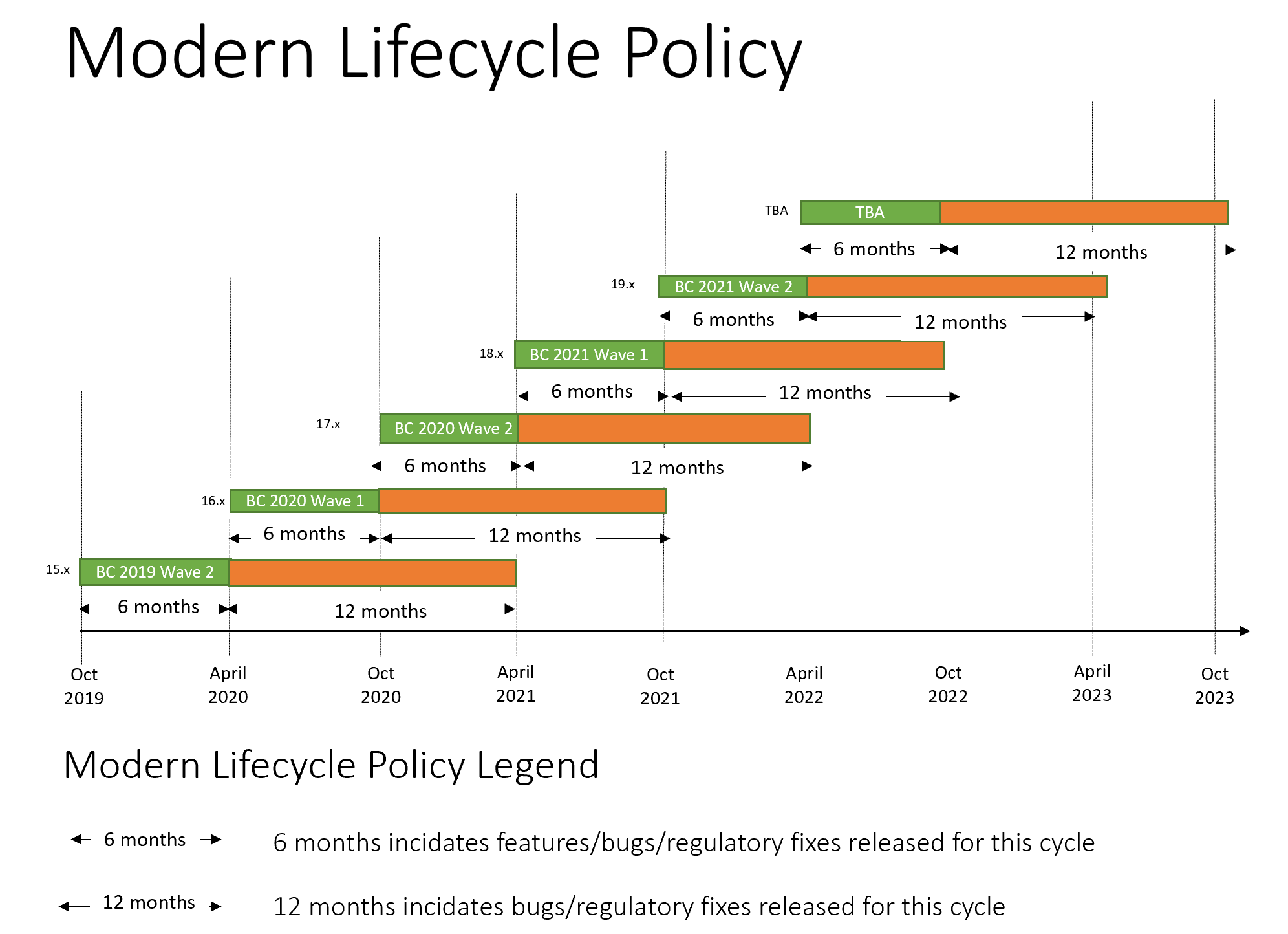Friday, January 10, 2020
Even though the only option for new customers is Dynamics 365 Business Central, there are several Dynamics NAV versions that are still in mainstream support. However, Dynamics NAV 2015 will move out of Mainstream Support on January 14, 2020.
In addition, starting from Dynamics 365 Business Central Wave 2 (version 15), an updated software lifecycle policy has been established, named the ‘Modern Lifecycle’ Policy. With the ‘Modern Lifecycle’, each version will be supported for 18 Months, without option for Extended Support.
In this blog post, we will review what the end of Dynamics NAV 2015 Mainstream Support can mean for its users. In addition, the updated ‘Microsoft Support Lifecycle’ policy will be reviewed in comparison to the ‘Fixed Support Lifecycle’ policy.
Microsoft Dynamics Fixed Lifecycle Support Categories
Fixed Support Lifecycle policy includes 5 years Mainstream Support, then Extended Support. Dynamics 365 Business Central Spring 2019 release is the last version with Fixed Support Lifecycle.
The Fixed Lifecycle Support categories are the following:
- Mainstream Support – the product is receiving incident support, new features, security updates and non-security updates.
- Extended Support – the product is receiving security updates once warranty claims end and Microsoft is no longer accepting requests for new features or design changes.
- Beyond Extended Support – no updates of any kind.
As Dynamics NAV 2015 moves to Extended Support, there will be no possibility to request any design changes, warranty support or new features during this phase. As an example, when the General Data Protection Regulation was instated, Microsoft released update packages for all products in Mainstream Support. Doing this, simplifies the update process and reduces customer costs. Contrarily in Extended Support, the customers will most likely have to pay for the full cost of the required programming work themselves, in order to adapt to the newly applied changes.
The Modern Lifecycle Policy – What it is?
Modern Support Lifecycle is a support policy for continuously updated services. Overall, it includes 18 months of support.
For products governed by the Modern Lifecycle Policy, Microsoft will provide a minimum of 12 months’ notification prior to ending support, if no successor product or service is offered, excluding free services or preview releases. Products with existing Lifecycle Policies will continue to be supported according to the published end of support dates.
The Modern Lifecycle Policy requirements are defined below:
- Customers must stay up-to-date as per the servicing and licensing requirements published for the product or service. In order to stay current, you must take at least one of the 3 updates, released during each year.
- Customers must have the rights to use the product or service.
- Microsoft must currently offer support for the product or service.
The following image illustrates the update schedule for Dynamics 365 Business Central:

Fixed Lifecycle Polices vs Modern Lifecycle Policies
The Modern Lifecycle Policy differs in some respects from Fixed Lifecycle Policy, but contain similarities in their underlying principles. More information about these policies can be found on Modern Lifecycle Policy FAQ.
Similarities between the two Lifecycle Policies include security updates, which are provided at no charge. In addition, there is an established framework to help customers understand and predict updated cycles and Microsoft’s software lifespan.
The other similarity is regarding notifications. As in Fixed Lifecycle Policy, the Microsoft Modern Lifecycle Policy provides an explicit notification period, before customers must upgrade; otherwise, service degradation or interruption is possible.
One of the main differences between Lifecycle Policies, is that Modern Lifecycle Policy will no longer provide 5 years of Mainstream and then Extended Support, which was the norm for a Fixed Lifecycle Policy. Instead, a more rapid release pattern will be implemented for products and services under the Modern Lifecycle Policy.
What can the end of Dynamics NAV 2015 Mainstream Support mean for its users?
To avoid your business being exposed to various security and other threats, we recommend any Dynamics NAV 2015 (or older) customers consider an upgrade. With an upgrade you have new feature enhancements that may replace outdated and aging customizations in the current system and can meet today’s more demanding security requirements as Microsoft may not be able to provide security updates for older products.
Given that no new features will be introduced in Dynamics NAV 2015, Microsoft may decide to refrain from taking advantage of the new Microsoft Windows or Microsoft SQL Server capabilities. This could limit the use of new versions to the older solutions. As a result, you may end up wasting additional time and efforts trying to run the older Dynamics NAV solutions after changing your computer or server. So, the question becomes – how long can you afford to operate without your ERP running?
On the other hand, the longer you postpone, the more complex the system upgrade or any modifications become. Further, with the end of Extended Support you will no longer receive any security updates to your core ERP, which could become vulnerable, putting your business at risk of catastrophic system downtime and/or failure.
Not upgrading to the latest versions of Dynamics NAV / Dynamics 365 Business Central, means that you are missing out and cannot take advantage of numerous functionality improvements and useful features, such as:
- Web Client
- Phone Client
- Further integrations (with Microsoft Power Platform, AI)
- Increased length of text and code fields
- Addition of posting preview
- Merging of duplicate customers, vendors, or contacts
Plus, there are many various performance enhancements that are being missed, without upgrading to more current version of Microsoft Dynamics.
If you would like to discuss the benefits of upgrading or find out more about the 1ClickFactory Self-Provisioning for NAV/Business Central on Azure, contact us at service@1clickfactory.com.